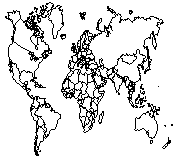
OBJECTIVES
To demonstrate knowledge of community group assessment practices, in the context of changes in the world order, identifying the social problems and the strengths and potential contributions of individuals, associations, and institutions.
| SOWK 7143 | Ray MacNair |
| Office: Room 106; Hours: M,T,R 10:00 to 12:00 | 542-5428 |
| rmacnair@uga.edu |
ORGANIZING COMMUNITY GROUPS
PURPOSE
The purpose of this course is to understand and demonstrate community group assessment, community group formation and development, and community group facilitation practices. The dynamics of organizing groups and facilitating group leadership lie at the core of the purpose. Community groups are, of course, results oriented. The features of group formation and action arise when social justice and social change are anticipated. The focus on communities is a focus on organized identity and residence. Hence, the politics of place and diversity composition are essential components of the practices of organizing groups in communities.
 |
OBJECTIVES To demonstrate knowledge of community group assessment practices, in the context of changes in the world order, identifying the social problems and the strengths and potential contributions of individuals, associations, and institutions.
|
1. To understand the variety of community organizing goals and objectives as well as group work practice methods and strategies in the context of social work values.
2. To understand the policies of local, state, and federal governments which have an impact on community development and community action strategies.
3. To demonstrate an understanding of the process and goals of community group formation, leadership, and development.
4. To review and understand various models of community groups: conscientization (political education) groups; collaborative networks; conflict bridging groups; activity/socialization groups; community development groups; spirituality based action/caring groups; social movement groups; self help/empowerment groups.
5. To review fund raising strategies as they apply to community goals and objectives.
6. To review research strategies as they apply to the assessment and evaluation of neighborhood development and organizing practices.
TEXTS:
Resource texts:
TOPICS:
|
 |
|
|
ASSIGNMENTS:
Grading:
The final course evaluation is calculated by adding up the points indicated above. In the case of a borderline score, the subjective evaluation of the instructor is allowed, but not otherwise.
|
|
CLASS SESSIONS
| SESSION 1: INTRODUCTION |
- Course plan; assignments
- Review group and organizational analysis
- Analysis of postmodern communities and identities
- Experience in organized groups
- Talents one brings to the field of organizing groups
- Proposed learning service projects
- Action system theory: group development (instructor's experience)
- Reading assignments
| SESSION 2: LEADERS AND ORGANIZATIONS |
READINGS:
- Kahn text, chapters 1-3
- Moore and Feldt text, Introduction
- One of the following:
- Rubin and Rubin Community Organizing and Development Chapter 1, Organizing for Collective Empowerment
- Medoff and Sklar, Streets of Hope, Chapter 2 Creating the Dudley Street Neighborhood Initiative
- Bobo Organizing for Social Change: Midwest Academy Manual for Activists Chapter 11, Developing Leadership
- Delgado, Community Asset Assessment by Latino Youths, chapter 18, in Ewalt, et al, Community Building
- Robin, Saving the Neighborhood, chapter 5, The Organizational Who
- Zander, Effective Social Action by Community Groups, chapters 1-3
- Bakalinsky, The Small Group in Community Organization Practice, Ch. 6, in Rothman, et al, Strategies of Community Intervention
| SESSION 3: CONSTITUENCY ORGANIZING; FORMS OF IDENTITY; TYPES OF GROUPS |
READINGS:
- Kahn, chapters 4-6
- Moore and Feldt, Chapters 1 and 2
- One of the following:
- Rubin and Rubin, Chapters 5,6, and 7
- Medoff and Sklar, Streets of Hope, chapter 3, Don't Dump on Us: Organizing the Neighborhood
- Bobo Chapter 10, Recruiting
- Morrison, et al, Strengthening Neighborhoods by Developing Community Networks, chapter 10 in Ewalt, Community Building
- Billingsley, Climbing Jacob's Ladder, chapters 17, The Black Church: Spiritual Values and Community Reform, and 18, Climbing Jacob's Ladder: Self Help Redefined
- Zander, Effective Social Action by Community Groups, chapter 4, Properties and Styles of Community Groups
- Illenberger and Wallach (1998) Popular Education for Movement Building: A Resource Guide Atlanta: Project South, Introduction and Part 4, The Small Working Groups
- Levay and Nonas, City of Friends: A Portrait of the Gay and Lesbian Community in America (to be copied on request; it is lengthy)
| SESSION 4: MEETINGS, STRATEGY, SKILL, AND TACTICS |
READINGS:
- Kahn, chapters 7, 8, and 10
- Moore and Feldt, Chapters 3 to 9
- One of the following:
- Hanna (1995) Strategies for Community Empowerment, chapters 2 and 6
- Robin, Saving the Neighborhood, chapter 2, Telling the People Who Need to Know; chapter 7, What You're Working For (calculating what's attainable, etc.)
- Rubin and Rubin Chapter 10, Developing Capacity through Participatory Meetings
- Bobo, Chapters 8 and 12 (accountability sessions; facilitating meetings)
- Tropman, J. and Morningstar, G. The Effective Meeting: How to Achieve High Quality Decisions, pp. 183-200 in Tropman, et al, Tactics and Techniques of Community Intervention
| SESSION 5: TRAINING, COMMUNICATION, AND MEDIA |
READINGS:
Kahn chapters 11-13
One of the following:
- Bobo, Chapter 15, Designing and Leading a Workshop
- Robin, Saving the Neighborhood, chapter 6, How to Get Organized
- Brawley (1995) Human Services and the Media: Developing Partnerships for Change Newbury Park, CA: Sage Publications, Chapters I and V
- Rubin and Rubin Chapter 14, Extending Power through... Publicity...
| SESSION 6: MONEY AND THE CONSTITUTIVE ORDER |
READINGS:
Kahn, chapter 14
One of the following:
- Rubin, Chapter 7, The Art of Leveraging
- Rubin and Rubin Chapter 15, The Social Production Model
| SESSION 7: IS THAT RIGHT? RESEARCH FOR PRACTICE |
READINGS:
SESSION 8: POLITICS AND COALITION ORGANIZING AUGUST 8Kahn, Chapter 9, Research
One of the following:
- Rubin and Rubin Chapter 8, Gaining Power Through Community Research
- Fischer, F. Community Inquiry and Local Knowledge: The Political and Methodological Foundations of Participatory Research, Chapter 9 in Fischer, Citizens, Experts, and the Environment
- Chapter 8, Evaluating Outcomes: Victory and Defeat
- Schulz, et al, Development amd Implementation of Principles of Community-Based Research in Public Health, in MacNair (Ed) (1999) Research Strategies for Community Practice New York: Haworth Publishers
READINGS:
Kahn, chapters, 15 to 17 (politics, unions, coalitions)
One of the following:
- Rubin and Rubin Chapter 14, Extending Power Through Coalitions ...and Skillful Negotiations
- Medoff and Sklar, Streets of Hope, chapter 4: Planning an Urban Village and chapter 9, Pathfinders
- Fisher, Let the People Decide, chapter 7, Conclusion: The Nature, Potential, and Prospects of Neighborhood Organizing
- Rubin, Chapter 9, Creating a Common Culture within the Community Development Movement; and Chapter 10, Traditional and Coalition Advocacy
- Bobo Chapter 9 Building and Joining Coalitions

|
FINAL EXAM PERIOD: COMMUNITY LEARNING-SERVICE REPORTS |
Billingsley, A. (1992) Climbing Jacob's Ladder: The Enduring Legacy of African American Families New York, NY: Touchstone
Bobo, K., Kendall, J. , and Max, S. (2001) Organizing for Social Change Santa Ana, CA: Seven Locks Press
Campfens, H. (Ed) (1999) Community Development around the World: Practice, Theory, Research, Training Buffalo, NY: University of Toronto Press
Delgado, G. (1994) Beyond the Politics of Place Oakland, CA: Applied Research Center
Erlich, J. (1995) Community Organizing in a Diverse Society Boston, MA: Alllyn and Bacon
Ewalt, P., Freeman, E., and Poole, D. (Eds.) (1998) Community Building: Renewal, Well-Being, and Shared Responsibility Washington, D.C.: NASW Press
Faulkner, A., Roberts-DeGennaro, M., and Weil, M. (1994) Diversity and Development in Community Practice Binghampton, NY: Haworth Press
Fellin, P. (1995) The Community and the Social Worker Itasca, IL: Peacock Publishers
Fischer, F. (2000) Citizens, Experts, and the Environment: The Politics of Local Knowledge Durham, NC: Duke University Press
Fisher, R. (1994) Let the People Decide: Neighborhood Organizing in America New York: Praeger Publishers
Fisher, R. and Kling, J. (1993) Mobilizing the Community: Local Politics in the Era of the Global City Newbury Park, CA: Sage Publications
Hanna, M. (1994) Strategies for Community Empowerment: Direct Action or Transformative Approaches to Social Change Practice Lewiston, NY: Mellen
Henderson, P. (1987) Skills in Neighborhood Work London: Allen and Unwin
Jones, S., and Zlotnik, L. (1998) Preparing Helping Professionals to Meet Community Needs Alexandria, VA: Council on Social Work Education
Kahn, S. (1991) Organizing: A Guide for Grassroots Leaders NASW Press
Kretzman, J. and McKnight, J. (1993) Building Communities from the Inside Out: A Path Toward Finding and Mobilizing a Community's Assets Evanston, IL: Center for Urban Affairs
Levay, S. and Nonas, E. (1995) City of Friends: A Portrait of the Gay and Lesbian Community in America Cambridge, MA: MIT Press
Maguire, L. (1983) Understanding Social Networks Beverly Hills, CA: Sage Publications
Medoff, P. and Sklar, H. (1994) Streets of Hope: The Fall and Rise of an Urban Neighborhood Boston, MA: South End Press
Moore, A.B. and Feldt, J. (1993) Facilitating Community and Decision-Making Groups Malabar, FL: Krieger Publishing
Morris, D. and Hess, K. (1975) Neighborhood Power: Returning Political and Economic Power to Community Life: The New Localism Boston: Beacon Press
Napier, R. (1993) Groups, Theory, and Experience Boston: Houghton,m Mifflin, and Co.
Prigoff, A. (2000) Economics for Social Workers: Social Outcomes of Economic Globalization with Strategies for Community Action Belmont, CA: Wadsworth (Brooks Cole)
Robin, P. (1990) Saving the Neighborhood: You Can Fight Developers and Win Rockville, MD: Adler and Robin Books, Inc.
Rothman, J., Erlich, J., and Tropman, J. (2001) Strategies of Community Intervention (sixth edition) Itasca, IL: Peacock Publishers
Rubin, H. (2000) Renewing Hope; Within Neighborhoods of Despair Albany, NY: SUNY Albany Press
Rubin, J. and Rubin, I. (2001) Community Organizing and Development Boston: Allyn and Bacon
Scheier, I (1984) Meanwhile--Back at the Neighborhood Boulder, CO: Yellowfire
Shragge, E. (1997) Community Economic Development: In Search of Empowerment Buffalo, NY: Black Rose Books
Tropman, J. (1997) Successful Community Leadership: A Skills Guide for Volunteers and Professionals Silver Spring, MD: NASW Press
Tropman, J., Erlich, J., and Rothman, J. (2001) Tactics and Techniques of Community Intervention Itasca, IL: Peacock Publishers
White, S. (1999) The Art of Facilitating Participation: Releasing the Power of Grassroots Communication Thousand Oaks, CA: Sage Publications
Zander, A. (1990) Effective Action by Community Groups San Francisco: Jossey-Bass